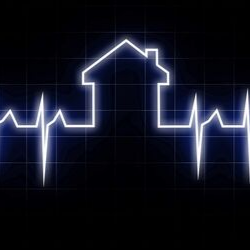
Stuart Long, CEO of InfoBionic, underscores how to increase patient compliance with cardiac monitoring.
“Remote patient monitoring not only gives people convenient access to their healthcare provider, but also a tangible connection to their own health.”
WALTHAM, Mass. (PRWEB)
September 25, 2019
Lack of patient compliance is a well-known source of frustration for physicians, particularly when it comes to people with chronic health conditions. Remote patient monitoring (RPM) can lead to greater patient engagement, which in turn can elevate compliance with physician recommendations, including taking medications as prescribed and making important lifestyle changes, said InfoBionic CEO Stuart Long.
While it’s counterproductive to ignore what physicians advise us, well-established human behavior has proven that we don’t always do what’s best for us. Not only that, patients who are only told what to do are less engaged and compliant than those who can see positive changes from following physician instructions, said Long, whose Massachusetts-based company makes a non-invasive, full-disclosure remote cardiac monitor.
Some healthcare experts call medical noncompliance a national epidemic [1].
“Patient engagement happens when patients take ownership of their health,” Long said. “Remote patient monitoring not only gives people convenient access to their healthcare provider, but also a tangible connection to their own health. That has a significant impact on engagement and compliance.”
It also can reduce healthcare costs. Eighty-six percent of healthcare costs are for people with chronic conditions, including diabetes, obesity, cardiovascular disease and dementia, according to data published in 2017 in the American Journal of Preventive Medicine [2]. A 2015 study in American Journal of Managed Care found that people who received the most healthcare, especially patients with more than one chronic condition, were five times more likely to need emergency department services [3].
Philadelphia cardiologist Colin Movsowitz, M.D. said that patients are far more likely to correctly wear a remote monitor when its operation is easy to understand, and it is simple and convenient to wear. This is especially important with older patients who may not be tech savvy, he said.
“The value of easy-to-use remote cardiac monitoring is tremendous,” Dr. Movsowitz said. “Not only because of the clinical data that we wouldn’t get any other way, but also because of the increased level of patient engagement, compliance and satisfaction.”
Patients, especially younger ones, want to use RPM and other telemedicine technology, according to Accenture’s 2019 Digital Health Consumer Survey, which found that 53 percent of patients surveyed said they are more likely to choose a primary care provider who uses remote or telemonitoring devices [4]. A 2018 survey by Black Book found that 84 percent of patients want providers who use technology that helps them communicate with their doctors and engage with their own health data [5].
In 2016, seven million people were using remote monitoring and other internet-connected medical devices, according to a report by Berg Insight. By 2021, that number is expected to increase to more than 50 million [6].
About InfoBionic
InfoBionic is a digital health company transforming the efficiency and economics of ambulatory remote patient monitoring processes by optimizing clinical and real-world utility for the users that need it most – physicians and their patients. The Massachusetts-based team of seasoned entrepreneurs have had successful careers in healthcare, IT, medical devices and mobile technology, and bring specific expertise in remote monitoring and cardiology. They have seen first-hand the complexities of traditional cardiac arrhythmia detection and monitoring processes and designed the transformative MoMe® Kardia platform to remove the roadblocks hindering faster, more effective diagnosis and decision-making. Frost & Sullivan bestowed the 2019 North American Remote Cardiac Monitoring Technology Leadership Award upon InfoBionic. For more information visit http://www.infobionic.com
About MoMe® Kardia
The company’s flagship product, the MoMe® Kardia 3-in1 monitor, is the first non-invasive remote cardiac monitor to offer truly full disclosure, heartbeat-to-heartbeat data over the Cloud, allowing doctors 24/7 real-time access to hospital telemetry-level data. With the MoMe® Kardia, doctors will be able to eliminate third-party monitoring data services and take full ownership of the cardiac monitoring process, empowering them to realize lucrative new revenue streams by billing globally for the monitoring service. MoMe® Kardia is not intended for use as an emergency medical response system. Call 911 if you feel you are having a medical emergency.
1. Scarlett, William, and Steve Young. “Medical Noncompliance: The Most Ignored National Epidemic.” The Journal of the American Osteopathic Association, American Osteopathic Association, 1 Aug. 2016.
2. Chapel, John M, et al. “Prevalence and Medical Costs of Chronic Diseases Among Adult Medicaid Beneficiaries.” American Journal of Preventive Medicine, U.S. National Library of Medicine, Dec. 2017.
3. Owens, Gary. “Economic Burden of Multiple Sclerosis and the Role of Managed Care Organizations in Multiple Sclerosis Management.” AJMC, 31 May 2016.
4. Safavi, Kaveh. “Today’s Consumers Reveal the Future of Healthcare.” Accenture.
5. Research, Black Book. “Hospital Technology Is the New Determiner of Patient Satisfaction, 2018 Black Book EHR User Survey Results.” PR Newswire: Press Release Distribution, Targeting, Monitoring and Marketing, 27 June 2018.
6. Insight, Berg. MHealth and Home Monitoring.
Share article on social media or email:

